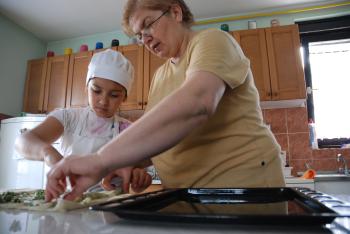A high percentage of children without parental care
-53366_JPG.jpg?width=800)
The city of Sarajevo is the largest city and capital of Bosnia and Herzegovina. The city was heavily destroyed during the Bosnian war between 1992 and 1995, and had to be reconstructed. For example, the waste water infrastructure had to be renewed in order to reduce the reliance on highly polluted water. Reconstruction is still on-going in other sectors.
The social fabric is also still healing from the war. The canton of Sarajevo has a high percentage of children who are living without parental care. The majority of the children have lost parental care due to complex social and economic reasons which have resulted in poverty. As the country recovers from the years of war, and in spite of the fact that Sarajevo is in one of the most economically stable areas of the country, many parents are not able to provide for their children. Although projects to integrate young people into the job market and support women and children who have suffered domestic violence have been implemented in the area, many people still urgently require support.
The SOS Family Strengthening Programme helps families stay together
The SOS Family Strengthening Programme plays a very important role in Mojmilo because the majority of the children who have lost parental care have done so due to economic or social reasons. This programme is run in conjunction with local agencies, and is intended to support families at risk of abandoning their children and to encourage families to stay together.
Children are provided with opportunities to develop their social and emotional skills through playing with each other. As parents attend training courses or go to work, it is important to provide good quality childcare in the neighbourhood. When children become young adults, they continue to need guidance; and our organisation aims to support them until they are ready to live confidently on their own.
What we do in Sarajevo

SOS Children's Villages started working in Sarajevo during the war to provide aid to children and young people. In order to help them overcome their post-conflict traumas, a counselling centre and a club were opened. These activities had to be stopped in 1995 due to the fighting, but more permanent programmes were set up after the war.
Strengthen families: The SOS Family Strengthening Programme was started in order to help families stay together and it offers training workshops, counselling and psychological support. However, if in spite of this support, children can no longer live with their families, they can find a loving home in one of the 16 SOS families, where up to 102 children can be cared for.
Education: We offer day care for young children from local vulnerable families; they can attend the kindergarten and receive pre-school education which will prepare them for school. In the autumn of 2003 a Play-Mobile Bus Project was started. We aim to keep children off the streets and grant them the opportunity to play with creative toys, or to learn about their rights. Local families have been very active in planning and participating in all of the above activities.
Support for young people: Young people who are ready to leave their SOS families, can move into special flats and houses where they are guided on their path to an independent life with the help of professionals.